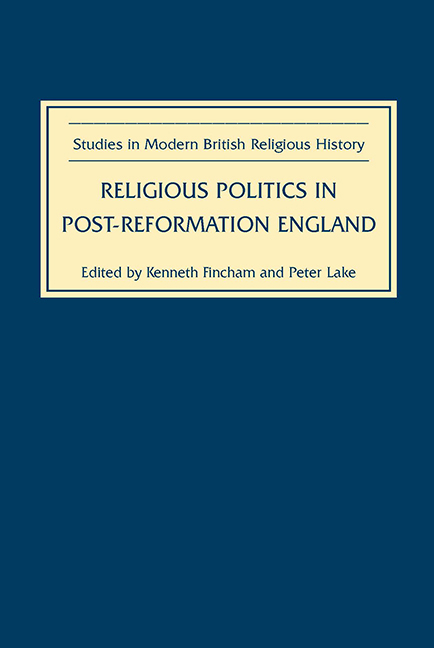Book contents
- Frontmatter
- CONTENTS
- Dedicaton
- Miscellaneous Frontmatter
- Preface
- Abbreviations
- 1 Introduction: Puritanism, Arminianism and Nicholas Tyacke
- 2 Art and Iconoclasm in Early Modern England
- 3 The Latitude of the Church of England
- 4 Joan of Contention: The Myth of the Female Pope in Early Modern England
- 5 Anti-Puritanism: The Structure of a Prejudice
- 6 The Fortunes of English Puritanism: An Elizabethan Perspective
- 7 What's in a Name? Dudley Fenner and the Peculiarities of Puritan Nomenclature
- 8 Puritan Preachers and their Patrons
- 9 New England's Reformation: ‘Wee shall be as a Citty upon a Hill, the Eies of All People are upon Us’
- 10 ‘Anglicanism’ by Stealth: The Career and Influence of John Overall
- 11 Destroyed for doing my Duty: Thomas Felton and the Penal Laws under Elizabeth and James I
- 12 Charles I and Providence
- 13 John Shawe and Edward Bowles: Civic Preachers at Peace and War
- 14 Material Evidence: The Religious Legacy of the Interregnum at St George Tombland, Norwich
- Index
- Tabula Gratulatoria
- Studies in Modern British Religious History
13 - John Shawe and Edward Bowles: Civic Preachers at Peace and War
Published online by Cambridge University Press: 25 October 2017
- Frontmatter
- CONTENTS
- Dedicaton
- Miscellaneous Frontmatter
- Preface
- Abbreviations
- 1 Introduction: Puritanism, Arminianism and Nicholas Tyacke
- 2 Art and Iconoclasm in Early Modern England
- 3 The Latitude of the Church of England
- 4 Joan of Contention: The Myth of the Female Pope in Early Modern England
- 5 Anti-Puritanism: The Structure of a Prejudice
- 6 The Fortunes of English Puritanism: An Elizabethan Perspective
- 7 What's in a Name? Dudley Fenner and the Peculiarities of Puritan Nomenclature
- 8 Puritan Preachers and their Patrons
- 9 New England's Reformation: ‘Wee shall be as a Citty upon a Hill, the Eies of All People are upon Us’
- 10 ‘Anglicanism’ by Stealth: The Career and Influence of John Overall
- 11 Destroyed for doing my Duty: Thomas Felton and the Penal Laws under Elizabeth and James I
- 12 Charles I and Providence
- 13 John Shawe and Edward Bowles: Civic Preachers at Peace and War
- 14 Material Evidence: The Religious Legacy of the Interregnum at St George Tombland, Norwich
- Index
- Tabula Gratulatoria
- Studies in Modern British Religious History
Summary
As the writings of the dedicatee of this volume amply demonstrate, the suppression of godly preaching, the prosecution of the preachers by the Laudians during the 1630s, and the assault by the crown on the upholders of godly rule in the provinces, the puritan magistracy, were recognized by contemporaries as among the chief grievances of those who opposed Charles I in both parliament and the country after 1640. Thereafter, the significance of that preaching, both in preparing the people for war and in justifying events once war broke out, was a matter for comment as early as the 1650s and has been the subject of recent historiographical debate. This essay will consider the response of such preaching to the breakdown of civil order through the careers of two friends, John Shawe and Edward Bowles. At different times each was employed as civic preacher at York, as preacher, and in Bowles's case as chaplain, to the parliamentary forces, and as chaplain to the Fairfaxes, and eventually, albeit briefly, as the recipient of royal patronage following the Restoration. The careers of both and their surviving sermons, printed and in manuscript, provide us with the opportunity to examine the shifting priorities of those godly puritan clergy of a broadly Presbyterian persuasion as they faced the changing circumstances of the mid-century while occupying pulpits in major provincial cities in Yorkshire, a region of intense military activity. How was godly rule perceived and implemented in such circumstances, away from parliament and the centre of government?
John Shawe, the elder of the two, was from Yorkshire, born in 1608 in Bradfield in the west riding, the only child of a modestly prosperous farming family. He entered the puritan Christ's College, Cambridge in 1623, where he fell under the spell of William Chappell, who he accounted ‘a very acute and learned man, and a most vigilant tutor’, a view not universally held among the godly. It was not Chappell, however, but the preaching of Thomas Weld, later to emigrate to New England, that determined Shawe on a clerical career, and he was ordained in 1629, proceeding MA the following year.
- Type
- Chapter
- Information
- Religious Politics in Post-Reformation England , pp. 209 - 223Publisher: Boydell & BrewerPrint publication year: 2006



